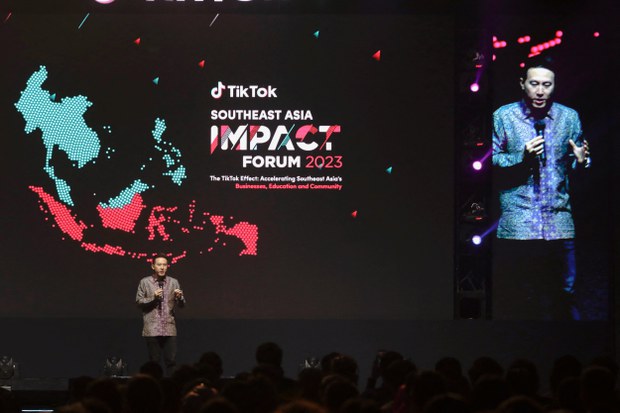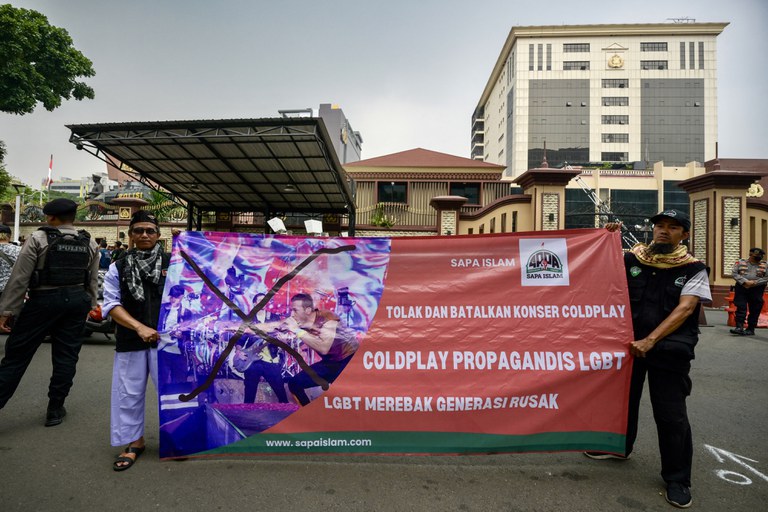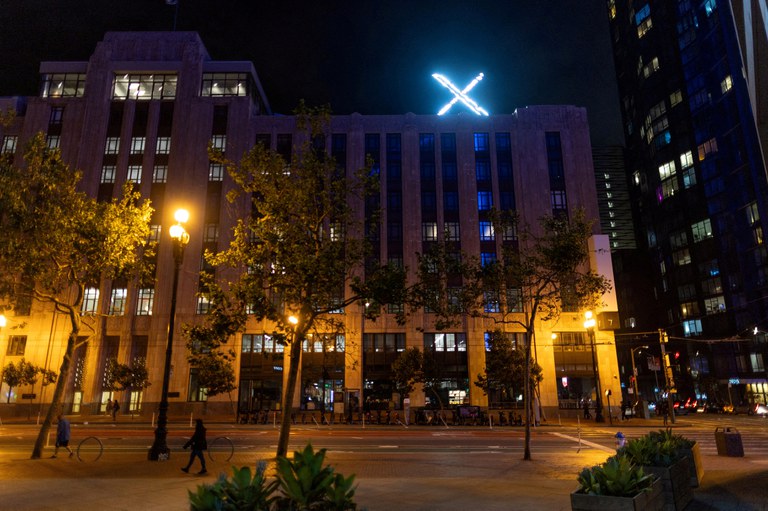Experts: Extremist groups spread disinformation online to provoke conflict during Indonesian election
2024.01.03
Klaten, Indonesia
 TikTok Chief Executive Officer Shou Zi Chew gives a speech during the launch of the TikTok Socio-Economic Impact Report 2023 event at The Ritz Carlton, Pacific Place in Jakarta, June 15, 2023.
TikTok Chief Executive Officer Shou Zi Chew gives a speech during the launch of the TikTok Socio-Economic Impact Report 2023 event at The Ritz Carlton, Pacific Place in Jakarta, June 15, 2023.
Radical and extremist groups in Indonesia have spread political disinformation online ahead of next month’s general election, with hoax content on the internet up nearly 80% last year compared with during the 2019 election, experts said.
The intent isn’t to influence the election result, researchers said, but to provoke conflict in society and undermine the electoral process ahead of the nationwide polls set for Feb. 14 in Southeast Asia’s largest country.
Hoaxes and fabricated stories about the election have been circulating on social media platforms like Facebook, X, and Instagram. While some are mere political mudslinging, others could have serious repercussions, observers said.
Husen Asyhari, from LPTI Pelataran Mataram, a research institute in Yogyakarta, sees a clear attempt to deliberately mislead the electorate with false information.
“There are efforts to influence voters through targeted disinformation, and some of it comes from terrorist groups with a historical anti-democratic stance,” Husen told BenarNews.
Among the groups Husen was referring to are Jemaah Islamiyah (JI), which was responsible for the 2002 Bali bombings, and the Islamic State group-linked Jamaah Ansharut Daulah (JAD), members of which targeted three churches almost simultaneously in suicide bombings in Surabaya in 2018.
Both groups want Indonesia to be governed by Islamic law.
In fact, in late October police said they had arrested 59 suspected militants from across the country belonging to JI and JAD as part of a pre-polls crackdown. Those arrested included the leader of a 40-member JAD team suspected of planning to disrupt the election, police said.
The Indonesian Anti-Defamation Society (Mafindo), which provided the data on the increase in hoax content in 2023 versus 2019, researched how much and what kind of fake material was put online last year.
Mafindo said it identified 2,178 pieces of hoax content from Jan. 1 to Dec. 22 last year, with 53% of that related to political disinformation.
LGBT issues a target
With the race for the presidency set to be among three candidates, Defense Minister Prabowo Subianto, former Central Java Gov. Ganjar Pranowo, and ex-Jakarta Gov. Anies Baswedan, who is popular among conservative Muslims, they have become targets, of course.
Among the plethora of disinformation was a TikTok video that claimed without basis that Anies would establish a caliphate if he became president.
According to Mafindo, some online hoax content has targeted Ganjar and his running mate, Mohammad Mahfud MD, over their alleged views on pornography and LGBTQI+ issues.
One of the fabricated stories claimed that ruling party nominee Ganjar had admitted to watching pornography since he was a child. However, according to Mafindo, he had only said, “So what if I watch pornography?” without a word about his childhood.
Another piece of fakery circulated on Facebook was a doctored photograph of Ganjar kissing a very young woman, with a post above the picture saying: “If this kind of person becomes the president, Indonesia will be destroyed.”
A false story attributed a statement to Mahfud MD that being LGBTQI+ was natural. Mafindo verified this was false and Mahfud MD denied making such a statement.
Candidates’ stance on LGBT issues has become a popular target for these online smear campaigns, said Arisdo Gonzales, an LGBTQI+ activist.
“I don’t know who is behind this, but it’s all over TikTok. Just type ‘LGBT’ and you’ll see them,” Arisdo told BenarNews.
He said these narratives fuel hate and discrimination against the LGBTQI+ community.
“It makes us anxious and worried,” he said.

Irfan Idris, the prevention director and spokesman for the National Counterterrorism Agency, said the authorities monitor the activities of militant groups, including on social media.
He said the agency coordinates with various ministries, institutions and civil society groups to prevent radicalization, but he didn’t give specific details on how the agency was dealing with dangerous disinformation.
“On social media, radical content has three characteristics: it teaches puritanism, it is anti-state and it is intolerant of differences in ethnicity, religion and race,” Irfan told BenarNews.
‘Want to provoke chaos’
Experts agree that these groups were unlikely to vote for specific candidates or directly align with any of the contenders
Their primary objective is to exploit the election and amplify divisive narratives for their own purposes.
“They want to provoke chaos and shape public opinion, not necessarily influence the outcome through votes,” Sopar Peranto, a researcher at the Habibie Center, told BenarNews. “The chaos benefits them.”
This turmoil, Peranto warns, could manifest as conflict between contesting parties and within the general public.
The strategy of these groups is evolving, said Mohammad Adhe Bhakti, researcher at the Center for Radicalism and Deradicalization Studies (PAKAR).
“To achieve their political goals, they’ll involve themselves in politics by any means necessary,” he told BenarNews.
JI, he said, had attempted to join politics by forming a party, but it didn’t qualify for this year’s election, having failed the verification process.
Adhe said the 2021 arrest of three members from JI, including a leader of a small political party linked to it, showed the group’s involvement in politics and its attempts to infiltrate government institutions.

He contrasted JI’s strategy with that of the Islamic State group-affiliated organizations, which maintain their distance from the electoral arena.
They do exploit the election period to further their agenda of establishing an Islamic state, though, often by provoking violence and planning attacks to divert security resources, Adhe said. The quiet period leading up to the election presents an opportunity for them to exploit security vulnerabilities.
“They target the police,” Adhe said.
“During the election, security forces are stretched thin. A distraction could be all they need.”







